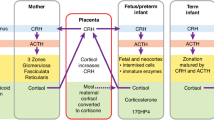Abstract
Summary: The change in the pattern of biotransformation of |14C|corticosterone in fetal mouse brain between gestational days 14 and 17 increased the proportion of unchanged hormone from 9-75% A sharp decrease in the in vitro incorporation of [14C]leucine, [3H|uridine, and [3H)thymidine into incubated brain coincided with this change and continued until day 19, when the incorporation of the 3 substrates had fallen to 9, 54, and 16% respectively, of that on day 14. Injection of dexamethasone reduced values on day 14 to those normally found on days 15-18. Enzymes which metabolize corticosteroids regulate their activity in specific tissues; these data suggest a hormonal influence on developing brain.
Speculation: Corticosteroids are known to induce metabolic processes in a number of fetal tissues; the brain can be included in these. These changes are mediated by enzymes in that tissue and do not necessarily involve the fetal pituitary-adrenal axis, nor the pattern of glucocorticoid receptors.
Similar content being viewed by others
Log in or create a free account to read this content
Gain free access to this article, as well as selected content from this journal and more on nature.com
or
Author information
Authors and Affiliations
Rights and permissions
About this article
Cite this article
Tye, L., Michaud, N. & Burton, A. Corticosterone Metabolism and the Incorporation of Leucine, Uridine, and Thymidine into Fetal Mouse Brain. Pediatr Res 12, 1152–1154 (1978). https://doi.org/10.1203/00006450-197812000-00011
Issue date:
DOI: https://doi.org/10.1203/00006450-197812000-00011



